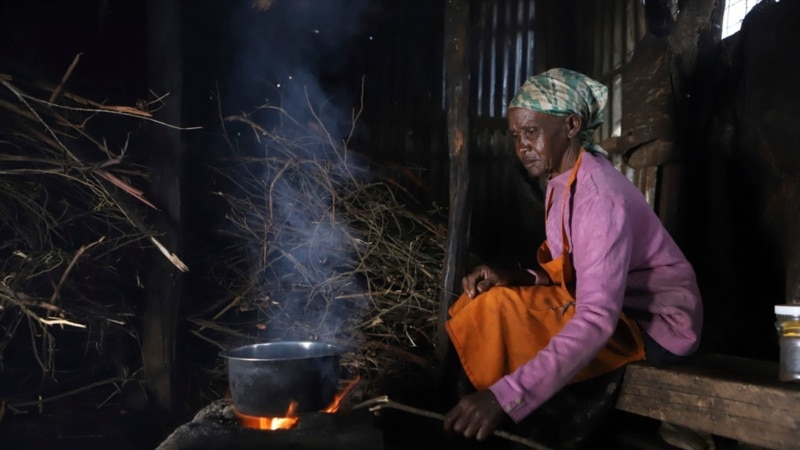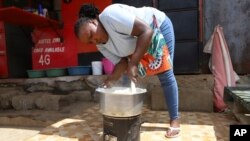This website uses cookies so that we can provide you with the best user experience possible. Cookie information is stored in your browser and performs functions such as recognising you when you return to our website and helping our team to understand which sections of the website you find most interesting and useful.
 NAIROBI, Kenya —
NAIROBI, Kenya —
Piles of firewood surrounded Jane Muthoni in her kitchen made of iron sheets. The roof, walls and wooden pillars were covered in soot. As she blew on the flame for tea, the 65-year-old was engulfed in smoke.
"I've used firewood all my life," she said. "Sometimes I usually cough from inhaling the smoke, and my eyes itch, but there's nothing I can do about it. I don't have money to even buy charcoal."
She was unaware of the lasting toll on her health. But experts are.
Respiratory diseases have been the most prevalent diseases in Kenya for the past several years and are on the rise, according to government authorities, with 19.6 million reported cases last year.
Burning biomass such as firewood is the largest contributor to those diseases, said Evans Amukoye, a scientist with the Kenya Medical Research Institute's respiratory diseases research center.
"One can have itchy eyes, coughs while inhaling the smoke, and for serious cases like chronic obstructive pulmonary disease, you find that you cannot walk as your lungs have become tight," Amukoye said. The disease is caused by indoor or outdoor air pollution or smoking.
Data from Kenya's health ministry shows that chronic obstructive pulmonary disease is responsible for 1.7% of deaths in the country.
People in low-income areas are diagnosed with respiratory diseases later in life compared to middle-class people in urban areas with better awareness and access to health care, Amukoye said.
Families in informal neighborhoods and rural areas are the most affected as most people rely on firewood or fossil fuels for cooking. Women hunched over a smoking fire at stalls for tea or snacks is a common sight in the capital, Nairobi, and beyond.
The government's 2022 Demographic and Health Survey showed a high dependence on traditional fuels for cooking in Kenya. The number of households relying on biomass like firewood increased from 4.7 million to 6.7 million between 2020 and 2022.
Economist Abraham Muriu said he believes the increase in Kenyans using firewood is a result of economic shocks caused by reduced incomes during the COVID pandemic and ongoing high inflation.
"Firewood is readily available and the most accessible fossil fuel, especially in rural areas," Muriu said.
He said more Kenyans in urban areas have likely resorted to using firewood or charcoal, too, as prices and taxes rise. Blackened sacks of charcoal are openly on sale at some Nairobi intersections, and the hunt for firewood across the country is constant.
Mercy Letting, 33, a businesswoman in Nairobi's Kasarani neighborhood was using charcoal to make meals for customers in the first six months after opening her restaurant early last year. With time, it affected her health.
"I am asthmatic, so whenever I used charcoal to cook the smoke would always trigger an attack, forcing me to spend part of my daily earnings on medication. This happened five times," she said.
She found it expensive, spending 4,500 Kenyan shillings ($33) per month to buy a sack of charcoal. "I eventually had to buy an 'eco-friendly' cooker, which has been great for my health and good for business." It requires less charcoal.
Letting also bought an induction burner, which she said is faster in cooking and more efficient as she spends only 50 Kenyan shillings ($0.38) per day on electricity.
Although companies pursue "clean cooking" options, high prices remain an obstacle to many Kenyans.
"If we want to deliver a truly clean and efficient solution to users across Africa, it needs to be affordable for them," said Chris McKinney, the chief commercial officer at BURN Manufacturing, which describes itself as a "modern cookstove" company based on the outskirts of Nairobi.
"This has been the key barrier to scaling for us," he said.



 Africana55 Radio
Africana55 Radio 

